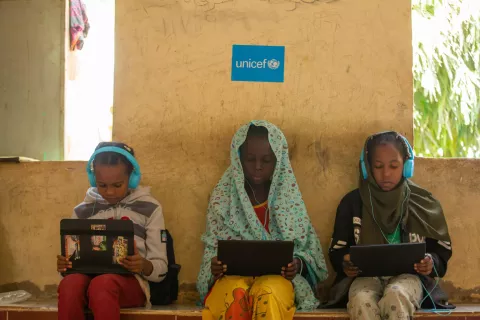Families welcome vaccination campaign in Yemen
46,000 health workers are taking part in a nation-wide campaign in Yemen to vaccinate five million children against polio.

- Available in:
- English
- 中文
Abdul Aziz Mohammed Basaad knows the importance of getting children vaccinated, which is why he recently welcomed health workers into his home to inoculate his young grandchildren. The health workers were two among a total of 46,000 who are taking part in a nation-wide campaign in Yemen that aims to vaccinate five million children against polio.
AL MUKALLA, Yemen, 22 June 2016 – When two young health workers knocked at his door to vaccinate his seven grandchildren, Abdul Aziz Mohammed Basaad welcomed them into his home. Many parents simply bring their children to the door to be vaccinated, but Basaad’s offer of a brief rest in an air-conditioned room and a glass of juice and cold water were his way of showing his appreciation.
These are angels of mercy. They move from one house to another to help people,” the 61-year-old retired teacher said.
These particular health workers were conducting a polio vaccination campaign. Once they had recharged their batteries, Mr. Basaad brought his grandchildren over one by one to be inoculated.
“I believe in vaccinating my grandchildren and advise other people to do the same because I saw many physically handicapped people whose parents neglected vaccination,” he said.
Spreading the word
Mr. Basaad believes that many families resist vaccination because they are not fully aware of the dangers of leaving their children unvaccinated. He also knows that intensifying public awareness ahead of each new round of vaccination campaigns is crucial.
However, in April 2015, Mukalla’s radio station was burned and shut down after heavy fighting. Mr. Basaad says that the port city and many neighbouring regions have lost an important vehicle for spreading health awareness among people. He suggests speaking to people directly and putting up posters everywhere in the community to reach beneficiaries quickly.
“People should be educated about the importance of vaccination,” he said. “Health workers need to come to public gatherings to tell people why they should immunize their children."
Mr. Basaad has seen the harmful effects of not vaccinating children. “Ten years ago, a large number of people used to refuse vaccination. Now some of those children are paralysed,” he said. “Vaccination campaigns are part of relief efforts. Relief does not only mean bringing food baskets.”
Reaching all children
In 2015, around 3.9 million children under the age of 5 were given the oral polio vaccination and 4.1 million children from 6-59 months were given Vitamin A supplements. From 10 to 12 April, Yemen launched a new countrywide polio campaign to reach even more children. The campaign covers Yemen’s 327 districts, using more than 19,000 mobile teams and 2,647 fixed health centres. Children in the previously unreachable cities of Taiz city, Sa’ada and Aden also benefited from the campaign.

As the largest contributor to immunization efforts in Yemen, UNICEF procured polio drops and other vaccines for the entire country. The agency also supported mass communication campaigns, provided technical expertise to the Ministry of Public Health and Population and covered the operational costs of the polio immunization campaign in seven governorates.
Protecting lives, one drop at a time
Joma’a Ayedh lives with her husband and four children in a small house on the outskirts of Mukalla. The family fled the city of Aden in 2015 during the fierce fighting between government forces and Houthis.
Ms. Ayedh says that some people who moved from rural areas to Mukalla don’t want to vaccinate their children. “Those people who used to live in the countryside don’t take children to health centres or allow mobile health workers to vaccinate them.”
She learned about the polio vaccination campaign from an SMS on her mobile phone. She is another example of the many parents who welcome the vaccinators wholeheartedly.
“I have vaccinated all of my children,” she said. “When I was a child, my siblings and I used to contract measles. Now, my children are not suffering from this disease thanks to the vaccination.”



